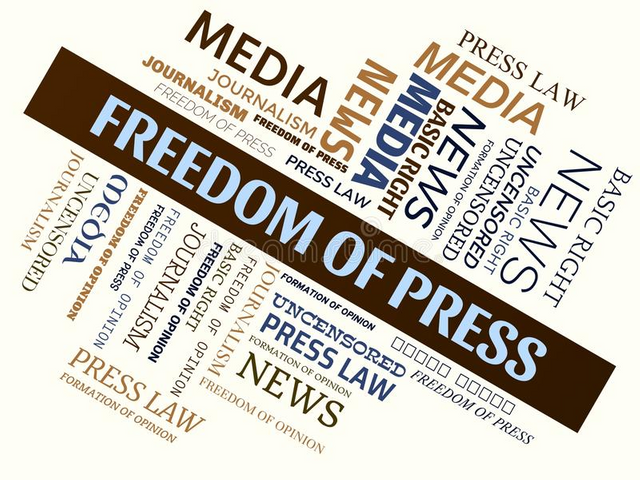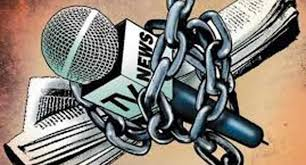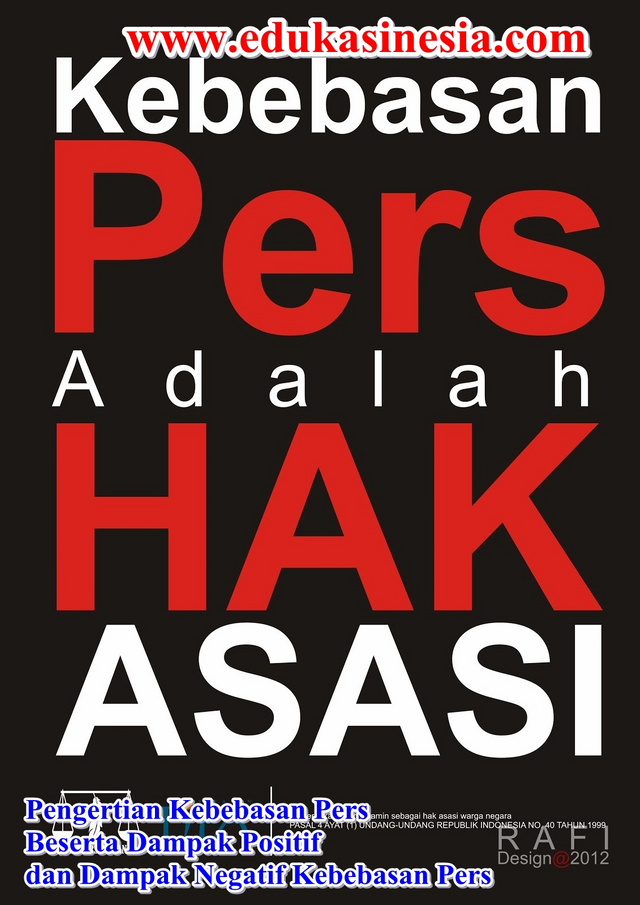FREEDOM OF PRESS
Rapid development in the world of press and mass media, has made the information state is the final round of development of so many tendencies model countries in the world. The immediate impact, illustrated in the fact that the phenomenon of the development of the press world has a powerful power to influence the cultural and ethical changes of society.
Islamic Sharia is universal to regulate all aspects of human life, including the world of journalism. In the "abdomen" of the books of fiqh (both classical and modern), there is a content that must be used as a rule in mengguluti work journalism. The press as a world of professionalism and study studies, although relatively new to emerge with the rules and basic rules. One of the ethical codes of the press is free and responsible which is a guideline in the behavior and deeds one of which is free from the pressure of others in finding and collecting and expressing their opinions through the media and presenting information to the public.
The Qur'anic and Hadith view of press freedom tends to be formalized by the prevailing press system, as are all other theories of press freedom, so that all theories will be absorbed into the system. In fact the Pancasila press system does not contradict the theological view of press freedom and its restrictions. Means, responsibility for freedom of the press or freedom of information according to Islam, no different from what is in the criminal law of the mass media or the criminal law of communication and the code of ethics of journalism.
In this short paper, the author will discuss briefly about the notion of press freedom, theories of the press, the code of journalism ethics, and the freedom of the press from the point of view of Islam or the freedom of the perspectives of Islam, essentially the freedom of the press of Islamic perspective in accordance with ethical or ethical code the press in general.
Freedom of the press includes freedom of thought, freedom of speech, and freedom of expression. Disclosure of an event, or opinion may be expressed through oral, pen, or action. Among the goals of journalism is transferring, in the form of information, about human behavior, feelings and thoughts. The existence of freedom of speech occurs after freedom of thought is assured. Therefore, when discussing the freedom of the press in Islam, we need to talk about freedom of thought and freedom of expression (expressing opinions and criticism), according to an Islamic perspective.
Islam guarantees the freedom of thought in a concrete and real way. Because this freedom is governed by morals and supervised at all times by the observance of Allah SWT. Moreover, in Islam thinking, doing research and research is recommended and is a legitimate worship and method to achieve faith in God. It also reveals the majesty of His power and creation.
Because Islam rejects any unfounded claim to the theorem and evidence, thinking, tadabbur, researching and studying is the duty of all mankind. Allah speaks in the Surah An-Naml which means:
Or who created it (man from the beginning), then repeats it (again), and who also gives you sustenance from heaven and earth? is there beside Allah there is God (the other) ?. Say: "Bring your proofs of truth if you are truthful." (Q.S An-Naml: 64)
Islam also obliges the Muslims to express their opinions and criticize the mistakes. When the right is deprived, the truth is ignored, and the more apparent deviance in society, the Muslim individual without exception, is obliged to take firm and active steps in fighting it. This is the concept of amar makruf nahi mungkar known in Islam.
A journalist is also required to perform amar makruh nahi mungkar, the news about an event that is considered as a form of munkar, must be based on the intention and mission of makruh nahi mungkar (prohibit munkar), by using certain methods and processes. Vice versa, if the incident is assessed as a form of makruf (goodness) left or ignored by the public. All these endeavors, for all Muslim individuals, whether journalists or not, are obligations and responsibilities, not mere advice or rights
Freedom of the press in the view of Islam is not free without limitation but must be in accordance with the principles or norms that apply not to the press deviate from the principle or norm. Today we see the reality of many press that deviate from the teachings of the norms such as the prevalence of negative magazine press, porn action, it deviates from the teachings of Islam.
The principle or norm in the freedom of the press according to Islam as follows:
4.1. Free and Responsible
A journalist must be free from the pressure of others in finding and collecting and expressing his opinion through the media. In obtaining and conveying the truth, journalists must have freedom. No one can obstruct as long as it suits the corridor and ethics of Islam. Freedom in the Qur'an especially in religion. Like the Word of God in Medina in sura Al-Baqarah which means:
There is no compulsion to (enter) religion (Islam); Verily There is a clear right path from a misguided path. Therefore whoever denies Thaghut (Shaytaan) and believes in Allah, He surely has adhered to a very strong rope that will never break. and Allah is the Hearer, the Knower. (Al-Baqarah 256)
The statement gives the understanding that man is free to choose which religion he will embrace because he has been equipped with the intellect to choose and sort out which religion will be able to save him. Although Allah grants the freedom to embrace religion, the corridor of freedom is limited by the qad of tabayyana al-rusd min al-grayyi (in fact, it is obviously the right path of the perverted path), and the aspect of righteousness that Allah calls al-'urwat al-wutsqa (a very strong rope that will not break).
Freedom of the press (thinking and expressing), as well as other freedoms in general, is not absolutely unlimited. The existence of restrictions, not to castrate creativity and freedom, but to respect the rights and freedoms of others. Islam prohibits harassment or deeds that can bring a person's name down. Just as Islam also prohibits acts that do not heed the general ethics, spread evil through the news or others, or hostile acts against the religious syiar.
The freedom given to the press to receive and disseminate such information should be accompanied by a sense of responsibility. In the sense that the information conveyed must be true and realize the maslahah for human life. Hence freedom given must be accountable to God. Free one-sided and other side responsibilities can not be separated. The press is free to broadcast anything but must account for what it broadcasts, it must guarantee the truth that is communicated to the public.
Every soul is never given the task and responsibility beyond its ability. But what he does will be accounted for by every human being bound by what he endeavored: The Word of God Surat al-Thur which means:
each man is bound by what he does. (Al-Thur verse 21)
It is understood that none of the human practices can escape responsibility. Although given freedom, but everything must be accounted before God. Similarly it is against the press people who have to account for every activity journalism. Besides he is responsible to God as a creature, the press people also have to account for all his actions to the public readers, listeners and viewers.
4.2. Honesty of Communication
In the Qur'an, honestly it is synonymous with trust, which is a belief that connotes more belief in God. Communicators are required to maintain the mandate, not to convey the things that are not known, not contradict between words and deeds, and consider the fairness and feasibility of an information to be broadcast. Lie is a crime that is forbidden by God. Many verses of the Qur'an cursed liars. In the letter An-Nahl Allah mentions:
Those who invent falsehood are only those who do not believe in the verses of Allah, and they are liars. (Q.S. An-Nahl: 105)
Obviously in that verse Allah prohibits lying. In the context of mass communication like a journalist, then lying is a despicable trait, because it is very dangerous. Lies in mass communication will mislead the public because they have absorbed the wrong information. Of course such communication is the ethics of communication and teachings of Islam based on the Qur'an.
- Fair and impartial
In practice journalism applies fair and balanced ethical principles. Meaning a writing or a story should be presented impartially. The fair deity is the teachings of Islam, says al-adl in Islamic terms means to give something that a person's rights, or take something from someone who becomes his duty. Fair also means equal and balanced in giving back. In the letter An-An'am which means:
And when ye say, Be ye righteous, though he is your relative, and fulfill the promise of God. that is what God has commanded you to remember. (Q.S. An-An'am 152)
Our topic is to speak fairly. This means Muslims are commanded to communicate both oral and written with a fair, meaning that must communicate properly, impartial, balanced, and certainly in accordance with the rights of a person. Particularly in disseminating information to the public, a press person should not influence the affection or hatred of a person or group, so that the information conveyed in the mass media does not meet the ethics of justice or equal balance.
- Accuracy of Information
The accuracy of information in mass communication or for a journalist can be seen from the extent to which the information has been thoroughly researched and thoroughly, so that the information presented has reached accuracy. Conveying information appropriately is a fundamental foundation not to cause the reader, listeners, audience to experience errors. Mistakes caused by misdirection of information on the mass media, of course can be estimated how much harm and losses suffered by society a lot.
To achieve the accuracy of data and facts as material information will be submitted to the public required a thorough research by the press, especially journalists. Islamic teachings accommodate the ethics of accuracy of such information through several verses as in Al-Hujarat's letter which means:
O ye who believe! If thou wilt come unto thee the wicked bringeth a message, thou check carefully so that ye do not lay a disaster upon a people without knowing the circumstances which cause ye to repent of thy deeds. (Q.S. Al-Hujarat: 6)
The Qur'an suggests the existence of people who want and try to get something bad information spread among the people. Therefore, a person involved in communication activities should check and recheck the truth of the information it receives before it is submitted to others. . In addition to examining the material information received, journalistic ethics suggests to examine the integrity and credibility of sources that provide information, source trustworthiness is a prerequisite in journalism.
Journalists as a resourceful person as his analysis knife will always be selective in receiving information before broadcasting to others. In the letter of Al-Dzumar verse 18 which means:
Those who listen to the words then follow what is best among them. Those are the ones who have been given the God of guidance and they are Those who have reason. (Al-Dzumar18)
This verse reveals the characteristic of the so-called ulu al-albab. This person's characteristic is to analyze information, that is to try to know something by taking his mind seriously. Trying to hear something means to think and analyze it thoroughly. He distinguishes which information is good and which is bad and uses his knowledge critically.
- Constructive Criticism
One of the ethics of mass communication is to make constructive criticism of things that are not behaving properly, whether viewed from the perspective of the law as well as by the ethics and norms living in the community environment. The press is the right keeper in the middle of the reader. Any irregularities should not be tolerated, by the way the press criticizes the irregularities.
The way the press can do it in various forms. Sometimes he writes in the form of commentaries, reviews, criticism and sometimes also in the form of disclosure of irregularities in the form of reports or news writing. Constructive communication messages are strongly emphasized in Islamic communication. Constructive criticism conveyed by communicators or communicants, can be material for future improvement, and can avoid repetition of mistakes.
In the Qur'an, the believer is asked to exercise an obligation in the form of the work of asking others to do good, asking others to do good, and forbidding people to know munkar, as implied in the letter of Ali Imran verse 103 which means:
And let there be among you a people who call upon the virtues, enjoin the good and prevent from the evil, they are the ones who are lucky. (Q.S. Ali Imran103)
In this verse it is not every individual person of faith is required to carry out this command, because of the difference of ability. But in essence every individual has an obligation to preach according to his ability. Constructive criticism in mass communication, criticism intended for development, not to bring down someone or other institution.
- Author Analysis
In the introduction it has been mentioned that the press has grown so rapidly and has enormous influence in human life. And perhaps the biggest problem in this world is the "submission" of the press practitioners to the mere objective of the material, to the point that some people judge them to ignore religious teachings, press laws, journalistic codes of ethics, and so on.
After discussing at length in this paper, the authors can analyze some important things as follows:
First, Islam guarantees freedom of the press manivested in freedom of thought, freedom of expression, freedom of expression of criticism, which in Islamic language is termed amar ma'ruf nahi mungkar. Islam is a step ahead of other laws, which only consider it a right. In Islam, this freedom of law is obligatory, even worship and obedience.
Second, journalistic Jurisprudence is the things to be followed, in accordance with Islamic law (jurisprudence), in various journalistic activities which include seeking, obtaining, possessing, storing, processing, and conveying information in writing, voice, pictures, sounds and images and data and graphics or in any other form with available media. Or, a collection of Shari'a laws that relate to some stages of journalism work, to the point. So that when a journalist pursues the things contained in Jurisprudence journalism then the writer believes will be the creation of journalistic-journalistic professional, morals and loved and cherished by the public at large. And if observed between the press law and journalistic ethics code is very in accordance with the teachings or norms in Islam.
Thirdly, it is very logical that the freedom of the press (think and express), as well as other freedoms, is not absolutely unlimited. The existence of restrictions, not to castrate creativity and freedom, but to respect essential rights and freedoms, is never out of bondage and boundaries. Apart from something, it is bound by something else, for the sake of mutual benefit.
Fourth, the current condition especially in Indonesia has many of the press people who no longer apply the press law and code of ethics jusnalistik itself, because it appears lately the various slant terms in the world of journalism. Alleged accusations of people who say the press has been practicing "anarchy journalism", "provocative journalism", "black journalism", and other epithets that injure a peristic image, the allegations arise as a result of part of the press less consistent and consequently carrying out its code of ethics .
C. CLOSING
Freedom of the press in the view of Islam is not free without limitation but must be in accordance with the principles or norms that apply not to the press deviate from the principle or norm. The managers of mass communication must absolutely guided and rely on Islamic ethics or morals as being guided and demanded by the Qur'an and Hadith. The main points of Islamic ethics in mass communication are:
First, every press must be held accountable for its actions, meaning that no act is free from the aspect of accountability even though in practice, they have freedom, but can not escape from responsibility. Secondly, every press should be honest and clear in presenting information to the public, should not deny the data and facts in writing and reports, either through print or electronic media. Third, the management of mass communication must be careful in absorbing information to be further disseminated to the community carefully as well. The Four Press criticizes things that do not conform to the prevailing norm but do so in an ethical manner, not roughly criticizing the criticism. In conclusion the freedom of the perspectives of Islam is very much in line with the ethical code of the press and the norms of mass communication in general.



Media can make a nation and also can break a nation so it has to be used honestly,freely and carefully
Congratulations! This post has been upvoted from the communal account, @minnowsupport, by yusfriadi from the Minnow Support Project. It's a witness project run by aggroed, ausbitbank, teamsteem, theprophet0, someguy123, neoxian, followbtcnews, and netuoso. The goal is to help Steemit grow by supporting Minnows. Please find us at the Peace, Abundance, and Liberty Network (PALnet) Discord Channel. It's a completely public and open space to all members of the Steemit community who voluntarily choose to be there.
If you would like to delegate to the Minnow Support Project you can do so by clicking on the following links: 50SP, 100SP, 250SP, 500SP, 1000SP, 5000SP.
Be sure to leave at least 50SP undelegated on your account.